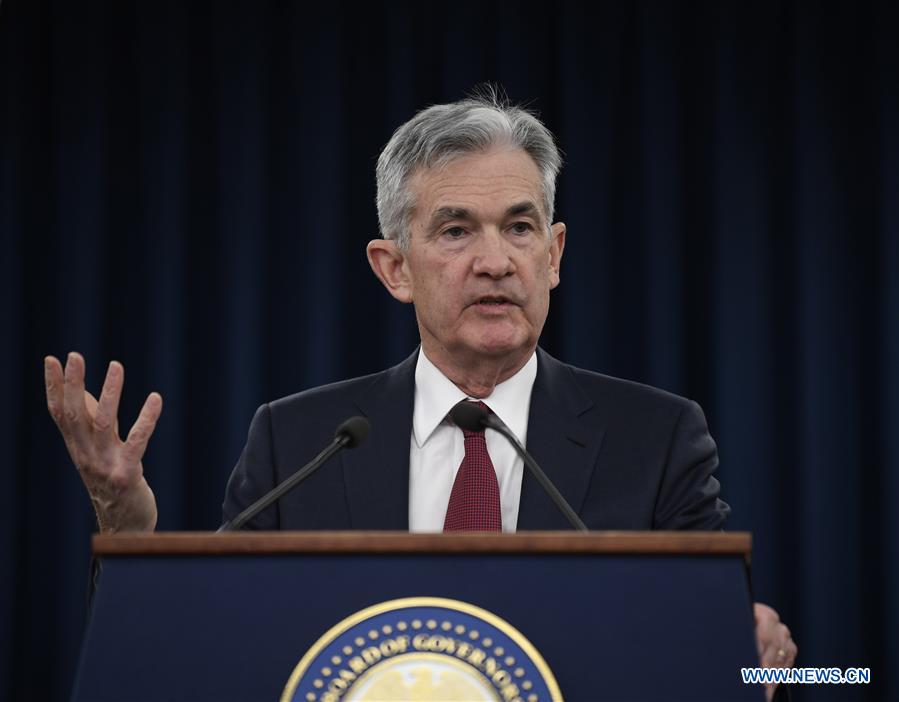
U.S. Federal Reserve Chairman Jerome Powell speaks during a press conference in Washington D.C., the United States, on Dec. 19, 2018. The U.S. Federal Reserve on Wednesday raised short-term interest rates by a quarter of a percentage point, but signaled a slower pace of rate hikes next year as the U.S. economy is expected to cool down. (Xinhua/Liu Jie)
WASHINGTON, Dec. 19 (Xinhua) -- The U.S. Federal Reserve on Wednesday raised short-term interest rates by a quarter of a percentage point, but signaled a slower pace of rate hikes next year as the U.S. economy is expected to cool down.
"In view of realized and expected labor market conditions and inflation, the (Federal Open Market) Committee decided to raise the target range for the federal funds rate to 2-1/4 to 2-1/2 percent," the Fed said in a statement after concluding a two-day policy meeting.
It marked the Fed's fourth rate hike this year and the ninth such move since late 2015, as the central bank moves forward on the path of monetary policy normalization.
The Fed said the U.S. labor market has "continued to strengthen" and economic activity has been "rising at a strong rate" since the last policy meeting in November, while growth of business fixed investment has "moderated" from its rapid pace earlier in the year.
Fed officials expected the U.S. economy to grow at 3 percent this year, a little bit lower than 3.1 percent estimated in September, according to the Fed's latest economic projections released on Wednesday.
Fed officials also revised down their forecast for U.S. economic growth in 2019 to 2.3 percent from 2.5 percent previously estimated.
With an expected slowdown in the U.S. economy, Fed officials envisioned two rate hikes next year, down from three estimated in September, according to the median forecast for the federal funds rate.
"Despite this robust economic backdrop and our expectation for healthy growth, we have seen developments that may signal some softening, relative to what we were expecting a few months ago," Fed Chairman Jerome Powell said Wednesday at a press conference.
"It is more likely that the economy will grow in a way that will call for two interest rate increases over the course of next year," Powell said, adding the tepid inflation gives the Fed the ability to "be patient" in moving forward on rate hikes.
But Powell also emphasized that the Fed's policy decisions are "not on a preset course." "There's a fairly high degree of uncertainty about both the path and the destination of any further increases," he said.
While U.S. economic growth will slow next year, it would continue pushing down the unemployment rate and intensifying inflationary pressures, according to Jeremie Cohen-Setton, a research fellow at the Peterson Institute for International Economics, a think tank based in Washington D.C.
"I'm more of the view that there would be three or four hikes (in 2019) simply because I think the unemployment rate is going to continue going down, which means that it's going to be below its natural rate, which is around 4 percent," Cohen-Setton told Xinhua in a recent interview.
If that happens, "you're going to have more wage pressures, and inflation is going to overshoot the target (of 2 percent) a little bit," he argued. "Therefore you're going to have a continuation in a tightening of Federal Reserve policy."
However, Tim Duy, a veteran Fed watcher and economics professor at the University of Oregon, believed that the central bank could pause rate hikes for some time after raising rates this week.
"If the economy turns slower more quickly than anticipated, this will be the last hike for some time if not the last hike of the cycle," Duy wrote in a blog post on Tuesday.
About 48 percent of 60 economists polled by the WSJ earlier this month estimated that the Fed would wait until March next year to raise rates again, while 28 percent expected the central bank to pause on rate hikes until June 2019.
"The risks surrounding housing plus global fault lines beginning to crack suggest a pause in the first half of 2019 is a plausible scenario," Constance Hunter, chief economist for accounting firm KPMG, was quoted as saying, according to the WSJ.
The Fed's meeting came after U.S. President Donald Trump urged the central bank to refrain from further hiking interest rates, citing recent market turmoil.
"Feel the market, don't just go by meaningless numbers," Trump tweeted on early Tuesday.
When asked about how he perceived the market, Powell said that Fed officials would look for material changes in financial conditions as market volatility doesn't necessarily result in major economic impact.
"We follow markets really carefully but remember, from a macroeconomic standpoint, no one market is the single dominant indicator," he said.